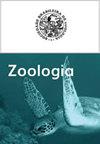雄性布氏田鼠对单宁酸的生殖反应
IF 1.8
4区 生物学
Q4 ZOOLOGY
引用次数: 4
摘要
单宁是存在于各种植物中的多酚类物质,可能含有促进动物繁殖的抗氧化特性。本研究探讨了单宁酸(TA)对雄性勃兰特田鼠(Lasiopodomys brandtii)生殖参数的影响(Radde, 1861)。具体地说,从青春期开始接受TA治疗的男性的血清抗氧化水平、睾丸自噬和生殖生理被评估。与对照组相比,低剂量TA显著提高了睾丸和附睾相对重量和附睾精子浓度,显著提高了血清超氧化物歧化酶(SOD)、过氧化氢酶(CAT)和谷胱甘肽过氧化物酶(GSH-Px)水平。自噬相关基因LC3和Beclin1 mRNA水平在低剂量TA组显著低于对照组。然而,与对照组相比,高剂量TA显著降低了血清SOD、GSH-Px、CAT、血清睾酮(T)和睾丸甾体性急性调节蛋白(StAR) mRNA水平。与对照组和低剂量TA相比,高剂量TA使精子异常和死亡率增加。总的来说,本研究表明,青春期的TA治疗对雄性勃兰特田鼠的生殖反应具有剂量依赖性。TA可能通过间接和直接途径介导睾丸自噬。TA主要通过调节抗氧化水平影响雄性勃兰特田鼠的生殖功能。这项研究促进了我们对单宁酸影响食草动物繁殖的机制的理解。本文章由计算机程序翻译,如有差异,请以英文原文为准。
Reproductive responses of the male Brandt’s vole, Lasiopodomys brandtii (Rodentia: Cricetidae) to tannic acid
Tannins are polyphenols that are present in various plants, and potentially contain antioxidant properties that promote reproduction in animals. This study investigated how tannic acid (TA) affects the reproductive parameters of male Brandt’s voles, Lasiopodomys brandtii (Radde, 1861). Specifically, the anti-oxidative level of serum, autophagy in the testis, and reproductive physiology were assessed in males treated with TA from the pubertal stage. Compared to the control, low dose TA enhanced relative testis and epididymis weight and sperm concentration in the epididymis, and significantly increased the level of serum superoxide dismutase (SOD), catalase (CAT), and glutathione peroxidase (GSH-Px). mRNA levels of autophagy related genes LC3 and Beclin1 decreased significantly with low dose TA compared to the control. However, compared to the control, high dose TA sharply reduced the levels of serum SOD, GSH-Px, CAT, serum testosterone (T), and mRNA level in steroidogenic acute regulatory protein (StAR) in the testis. Both sperm abnormality and mortality increased with high dose TA compared to the control and low dose TA. Collectively, this study demonstrated that TA treatment during puberty had a dose-dependent effect on the reproductive responses of male Brandt’s voles. TA might mediate autophagy in the testis, through both indirect and direct processes. TA mainly affected the reproductive function of male Brandt’s voles by regulating anti-oxidative levels. This study advances our understanding of the mechanisms by which tannins influence reproduction in herbivores.
求助全文
通过发布文献求助,成功后即可免费获取论文全文。
去求助
来源期刊

Zoologia
生物-动物学
自引率
0.00%
发文量
15
期刊介绍:
Zoologia, the scientific journal of the Sociedade Brasileira de Zoologia (SBZ), is an international peer-reviewed, open-access Zoological journal that publishes original research on systematics, evolution, taxonomy, nomenclature, biogeography, morphology, physiology, biology, ecology, symbiosis, conservation, behavior, genetics and allied fields. The journal, formerly known as Revista Brasileira de Zoologia, publishes original articles authored by both members and non-members of the Society. The manuscripts should be written exclusively in English.
 求助内容:
求助内容: 应助结果提醒方式:
应助结果提醒方式:


